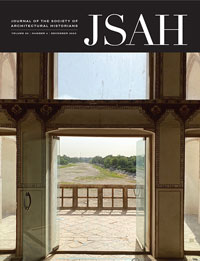Jul 27, 2020
by
University of Virginia School of Architecture
Dean Ila Berman and the members of the Dean’s Advisory Board are pleased to announce that Mabel O. Wilson, PhD, (UVA, BSArch 1985; Columbia, MArch 1991; NYU, PhD in American Studies 2007) has been selected as the 2020 Distinguished Alumni Award recipient. This award recognizes exceptional graduates from the School of Architecture who have demonstrated creativity, innovation, leadership, and vision through their distinguished body of work, within the professional, academic, civic, or artistic realms, as well as their service to the University of Virginia.
Mabel O. Wilson is a renowned leader in the field of architecture, noted as one of the most significant scholars and design researchers to emerge from her generation. She directs her transdisciplinary practice Studio &, which she founded in 2007, through and between the fields of architecture, art, and cultural history. Mabel is the Nancy and George E. Rupp Professor of Architecture, Planning, and Preservation and Professor of African American and African Diasporic Studies at Columbia University. Currently, she is the Director of the Institute for the Research in African American Studies, Director of Graduate Studies for the African American and African Diasporic Studies Department, and Co-director of Global Africa Lab (GAL) at Columbia.
As a child Mabel was introduced to architecture early growing up in a house that was designed by her father, an engineer in the US Department of Defense, and having a grandfather who was a builder. Yet when she came to the University of Virginia as an undergraduate student in the early 1980s, earning her Bachelor of Science in Architecture in 1985, she explained, “when I studied at the University of Virginia, I had a hard time connecting with what I was learning…I was never taught by anyone African American. No one African American ever sat on my reviews. I sat in histories, again and again and again, and I don’t think I ever saw anything a black person had conceptualized or made as an architect. That [has] led me down the path of the kind of work that I do as a scholar and a designer…”
Mabel’s experience has so clearly informed her life’s work — unpacking the implicit biases within design in the Western and imperial traditions, uncovering the limitations within the tools and methods that define our spatial practices, and repairing the incomplete narrative on African American contributions to the built environment. Her work has been groundbreaking in centralizing space, politics, and cultural memory in Black America, beginning with her 2007 PhD dissertation titled “Making History Visible: Expositions and Museums in the Black Metropolis: 1895-1995.” She has gone on to author significant scholarly works, including the book Negro building: Black Americans in the World of Fairs and Museums, which “reveals why the black cities of Chicago and Detroit became the sites of major black historical museums [long before, and] rather than, the nation’s capital.” The book was a runner-up for the John Hope Franklin Prize for the best American Studies publication in 2012. In 2009, Mabel joined on a design team for the museum competition with Diller Scofidio + Renfro and participated in the research behind the making of the National African American Museum of History and Culture in Washington, DC—one of the most significant works of this century. She was also selected by the museum’s Director Lonnie Bunch and Deputy-Director Kinshasha Conwill to write the book Begin with the Past: Building the National African American Museum of History and Culture for the Smithsonian in 2016, through which she chronicles the nation’s complex and difficult racial history with great acuity and insight. Her most recent book Race and Modern Architecture, co-edited with Irene Cheng and Charles Davis, challenges the suppression of race in canonical histories of modern architecture, while revising its standard association as a universal project of emancipation and progress.
Recently Mabel returned to the University of Virginia as part of the research and design team that created the Memorial to Enslaved Laborers, a memorial that commemorates the estimated 4,000 slaves that built the university and, in turn, provided the cornerstone for public higher education in the United States. Her projects, like the memorial at UVA, that has an anticipated public dedication ceremony scheduled for spring 2021, ask us to confront the complicated histories that were intrinsic to this nation’s founding, and critical for its future evolution and transformation. Frank Dukes, UVA’s Institute for Engagement and Negotiation Distinguished Fellow and collaborator on the memorial project described, “I was privileged to observe and work alongside [Mabel]. She has invested her incomparable knowledge of African and African American history, culture, and design throughout [the project]. Just as importantly, she has spent dozens of hours meeting with and listening to community members, alumni, students, staff, and faculty, to integrate their visions into a whole.”
This work, along with others like the design proposal for the African Burial Ground in Lower Manhattan and the “Marching On: The Politics of Performance” installation at the Storefront for Art and Architecture, reveals how her scholarship, creative practice and activism are wholly intertwined. Mabel is well-known for her committed leadership, by helping to create important advocacy projects such as Who Builds Your Architecture?, a collaborative that promotes dialogue about the ethics of global labor practices in architecture, and The Architecture Lobby, which advocates for the value of architecture to society at large. These organizations are platforms for activism and education focused on central ethical, social, and political questions within design and building practices.
The excellence of her work and her global influence are also evident in her numerous recognitions. Her many awards and fellowships include, to list a small few, the notable “Mentor and Educator of the Year” Award by Architecture Record (2019), the Arts and Letters Award in Architecture from the American Academy of Arts and Letter (2019, with collaborator Mario Gooden), the United States Artist Ford Fellowship in Architecture and Design (2011), and the Getty Institute Research Fellowship (2002).
While Mabel’s scholarly and design accomplishments, as well as her extraordinary teaching and mentorship, are marks of the impact she has made on the discipline and practice — she is acknowledged, again and again, for her unwavering clarity of purpose and limitless curiosity, coupled with her personal grace and deep intelligence. Executive Director of the NYC Public Design Commission Justin Garrett Moore noted her remarkable “ability to create the environment and conditions for important conversations to happen,” and colleague and collaborator Professor Mario Gooden described, “Mabel is constructing new knowledge that affects how we all look at history, and in turn, ourselves. This is a huge part of what makes her special.”
In receipt of this year’s distinguished alumni award, Mabel shared, “Architecture structures so much of our daily experiences that it often recedes into the background, and thus its impact is often underestimated. I believe it is vital that we understand architecture’s relationship with power, but also imagine ways to make spaces and places that are equitable and just. My educational experiences at UVA provided a fertile ground to pursue these questions across multiple fields and disciplines.”
The Dean’s Advisory Board at UVA School of Architecture is honored to be able to recognize Mabel’s extensive contributions to both the school and society at large. “Mabel’s unique accomplishments connecting design, cultural inclusion, advocacy, mentorship, and civil discourse are a brilliant example of the University of Virginia School of Architecture’s student and alumni community and represent the highest traditions of professional achievement recognized by this annual award,” said Chair of the Distinguished Alumni Award Committee and former Advisory Board Chair, Marcus Hurley (MArch ’00).
Dean Ila Berman elaborated, “Mabel’s list of accomplishments is truly extraordinary, and the diversity of her work is exceeded only by its excellence and the criticality of its presence in today’s climate. She is one of only a handful of individuals dealing with some of the most difficult issues of our time and encourages us to keep the design disciplines at the center of the building of a more just environment.”
The School of Architecture will welcome Mabel O. Wilson as the 2020 Thomas Jefferson Visiting Professor for the spring 2021 semester and anticipates a formal presentation of the Distinguished Alumni Award and celebratory event at that time.
Dr. Mabel O. Wilson has been an SAH member since 2012. She served on the Johnson Exhibition Catalogue Award Committee in 2011-12. Dr. Wilson gave the Eduard F. Sekler talk at the 2020 SAH Virtual Conference on "Home of the Oppressed": Democracy, Slavery and American Civic Architecture. To see the talk, click here
Read full article with illustrations here
Listen to a podcast from The Institute of Black Imagination featuring Dr. Wilson here


